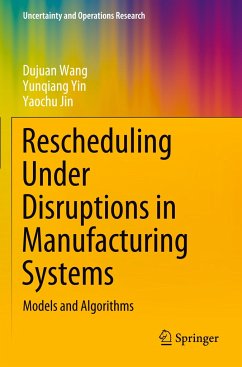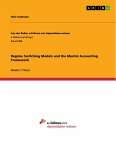This book provides an introduction to the models, methods, and results of some rescheduling problems in the presence of unexpected disruption events, including job unavailability, arrival of new jobs, and machine breakdown. The occurrence of these unexpected disruptions may cause a change in the planned schedule, which may render the originally feasible schedule infeasible. Rescheduling, which involves adjusting the original schedule to account for a disruption, is necessary in order to minimize the effects of the disruption on the performance of the system. This involves a trade-off between finding a cost-effective new schedule and avoiding excessive changes to the original schedule.
This book views scheduling theory as practical theory, and it has made sure to emphasize the practical aspects of its topic coverage. Thus, this book considers some scenarios existing in most real-world environments, such as preventive machine maintenance, and deteriorating effect where the actual processing time of a job gets longer along with machine's usage and age. To alleviate the effect of disruption events, some flexible strategies are adopted, including allocation extra resources to reduce job processing times or rejection the production of some jobs. For each considered scenario, depending on the model settings and on the disruption events, this book addresses the complexity, and the design of efficient exact or approximated algorithms. Especially when optimization methods and analytic tools fall short, this book stresses metaheuristics including improved elitist non-dominated sorting genetic algorithm and differential evolution algorithm. This book also provides extensive numerical studies to evaluate the performance of the proposed algorithms. The problem of rescheduling in the presence of unexpected disruption events is of great importance for the successful implementation of real-world scheduling systems. There is now an astounding body of knowledge in thisfield. This book is the first monograph on rescheduling. It aims at introducing the author's research achievements in rescheduling. It is written for researchers and Ph.D. students working in scheduling theory and other members of scientific community who are interested in recent scheduling models. Our goal is to enable the reader to know about some new achievements on this topic.
This book views scheduling theory as practical theory, and it has made sure to emphasize the practical aspects of its topic coverage. Thus, this book considers some scenarios existing in most real-world environments, such as preventive machine maintenance, and deteriorating effect where the actual processing time of a job gets longer along with machine's usage and age. To alleviate the effect of disruption events, some flexible strategies are adopted, including allocation extra resources to reduce job processing times or rejection the production of some jobs. For each considered scenario, depending on the model settings and on the disruption events, this book addresses the complexity, and the design of efficient exact or approximated algorithms. Especially when optimization methods and analytic tools fall short, this book stresses metaheuristics including improved elitist non-dominated sorting genetic algorithm and differential evolution algorithm. This book also provides extensive numerical studies to evaluate the performance of the proposed algorithms. The problem of rescheduling in the presence of unexpected disruption events is of great importance for the successful implementation of real-world scheduling systems. There is now an astounding body of knowledge in thisfield. This book is the first monograph on rescheduling. It aims at introducing the author's research achievements in rescheduling. It is written for researchers and Ph.D. students working in scheduling theory and other members of scientific community who are interested in recent scheduling models. Our goal is to enable the reader to know about some new achievements on this topic.
"The book presents an interesting inside to problems when scheduling is disturbed by breakdowns, unavailable jobs or arriving jobs during processing possibly including maintenance phases. All problems are NP-hard and are solved individually with an assortment of different ideas and all models are tested numerically in practice." (Helmut G. Kahlbacher, zbMATH 1462.90005, 2021)








